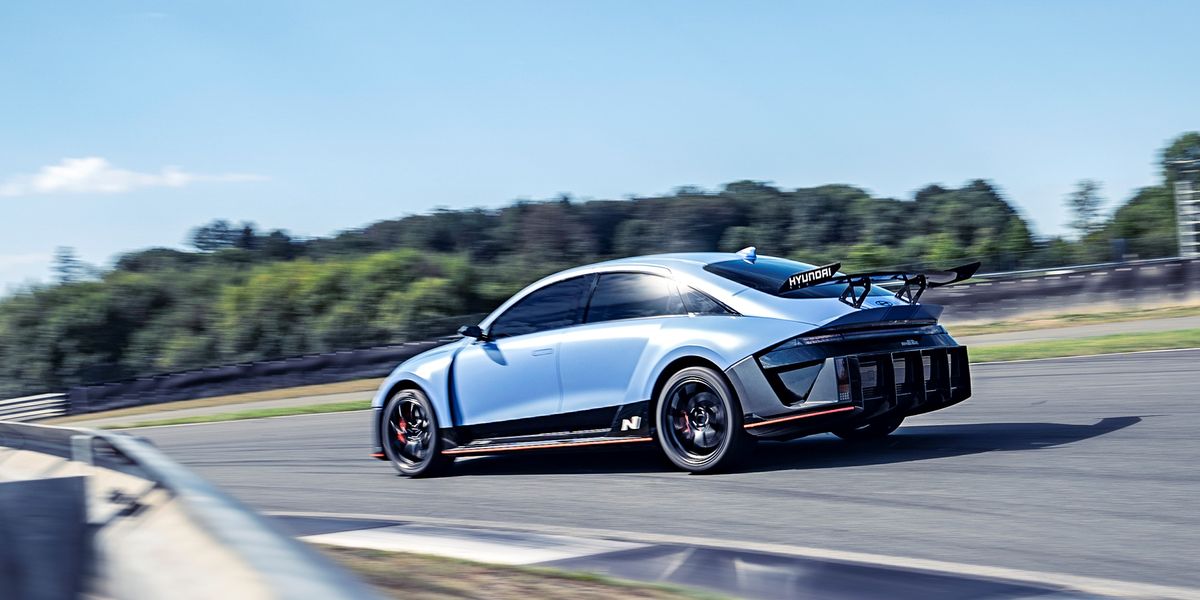Hyundai RN22e Provides a Near-Term Preview of Upcoming N Division EV Tech

Hyundai recently unveiled two forward-looking EV concepts that provide a look at performance in the electric era: the fuel-cell-powered hybrid N Vision 74 and the fully electric RN22e. While the former looks further out into the future, the RN22e is far closer to the zero-emission performance cars the company’s N division will soon be selling. Our experience driving the RN22e on a track provided a preview of the powertrain in the upcoming Ioniq 5 N, garnished with some additional intriguing tech.
Although officially a technology demonstrating concept, you don’t need to look too hard to see the production car that lurks within the RN22e. Beneath the scoops, spoilers, and widened bodywork, this is the upcoming Ioniq 6 sedan. Like the existing Ioniq 5, it sits on Hyundai’s E-GMP platform with its advanced 800-volt architecture, and although the high-output all-wheel-drive powertrain is going to make its debut in the N version of the Ioniq 5, we anticipate it won’t be long before an Ioniq 6 version follows.
We’ve already experienced another version of the new driveline in the impressive Kia EV6 GT that we drove in Europe last month. The RN22e features the same 77.4-kWh battery pack, and Hyundai quotes the same 430-kW (577-hp) peak output and up to 546 pound-feet of torque. The company’s engineers confirmed that the RN22e shares its motors with the Kia, with the rear motor using a dual-stage inverter that features silicon carbide semiconductors. The big hardware difference for the Hyundai is a twin-clutch rear differential that can send up to 100 percent of the rear motor’s output to either side.
The RN22e keeps the dashboard architecture of both the Ioniq 5 and 6, with twin digital display screens and climate controls with restful blue backlighting. But much of the interior has been comprehensively stripped out, including the carpets, and a sizable roll cage and tight-fitting bucket seats have been fitted. A motorsport rim replaces the airbag-equipped steering wheel, with drive and reverse selected via a rotary stalk. Despite the drivetrain’s obvious lack of gearing, there are still up and down paddles behind the steering wheel, and these don’t just control regeneration levels.
Our experience in the RN22e was limited to a brief stint on part of the Bilster Berg circuit near Paderborn, Germany, that’s built on the site of a former Cold War munitions depot. Herman Tilke designed the track, which uses the topography of its location to create some savage elevation changes, with many corner apexes hidden by crests. Accelerative performance feels very similar to that of the EV6 GT. Hyundai hasn’t quoted any official figures, but the RN22e feels at least as potent as the Kia and its claimed 60-mph time of 3.5 seconds. But it’s soon clear the RN22e has significantly more lateral grip and also feels lighter and more lithe in the corners.
Much of the adhesion was doubtless down to the prototype’s track-biased Pirelli P Zero Corsa tires. But the ease with which the RN22e’s cornering attitude could be tucked and tweaked was also evidence of the cleverness of its all-wheel-drive system, which can vary torque across the rear axle to help the car turn and dig in. Even when pushed to the very edge of adhesion on some of Bilster Berg’s faster corners it felt impressively stable. Hyundai’s executive technical adviser—and former R&D boss—Albert Biermann says one of the project’s targets is to allow production N EVs to lap the 12.9-mile Nürburgring Nordschleife at full speed without performance deteriorating.
The RN22e has two new functions to experience. The first is an aggressive sound system, which uses speakers to create an engine-like noise both inside and outside the car and which also adds some buzzing vibration through the seat base. Although this was more convincing than the sci-fi soundtracks created by some other automakers, it was still somewhat distracting on the track given the lack of any gearchanges.
That’s where the second system comes in: Hyundai engineers refer to it as the virtual gearshift, and it brings the steering wheel paddles into use. Once the system is switched on, the speakers start to simulate the sound of rising revs, ultimately bringing the car to a simulated rev limiter if the driver doesn’t “upshift” to the next ratio in time. This felt obviously silly, but also kind of fun. Although the system is still under development, Hyundai engineers say they plan to integrate it with a tachometer display and upshift lights and also to model the power characteristics of a combustion engine at different speeds to simulate the effects of short-shifting or upshifting early. It might be even ludicrous enough to catch on.
The Hyundai Ioniq 5 is our EV of the Year for 2022, with that deserved victory underwritten by both its stylish design and strong array of rational virtues. To judge from the RN22e, the soon-to-arrive N version of the Ioniq 5 is going to add a fair bit of crazy to that mix.
Specifications
Specifications
Hyundai RN22e
Vehicle Type: front- and rear-motor, all-wheel-drive, 5-passenger, 4-door sedan
PRICE
Rolling-lab prototype, not for sale
POWERTRAIN
Front Motor: permanent-magnet AC, 215 hp
Rear Motor: permanent-magnet AC, 362 hp
Combined Power: 577 hp
Combined Torque: 546 lb-ft
Battery Pack: liquid-cooled lithium-ion, 77.4 kWh
Onboard Charger: 10.9 kW
Transmissions, F/R: direct-drive/direct-drive
DIMENSIONS
Wheelbase: 116.1 in
Length: 193.5 in
Width: 79.6 in
Height: 58.2 in
Curb Weight (C/D est): 4250 lb
PERFORMANCE (C/D EST)
60 mph: 3.1 sec
100 mph: 7.5 sec
1/4-Mile: 11.3 sec
Top Speed: 161 mph
EPA FUEL ECONOMY (C/D EST)
Combined/City/Highway: 95/105/85 MPGe
Range: 250 mi
A car-lover’s community for ultimate access & unrivaled experiences. JOIN NOW

This content is imported from OpenWeb. You may be able to find the same content in another format, or you may be able to find more information, at their web site.



